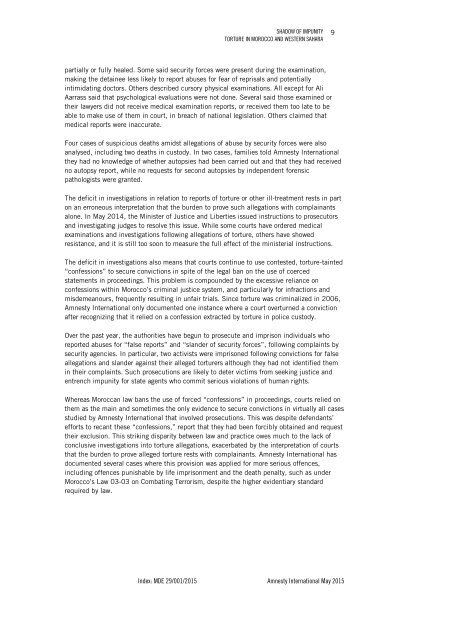7f2vH5qFw
7f2vH5qFw
7f2vH5qFw
Create successful ePaper yourself
Turn your PDF publications into a flip-book with our unique Google optimized e-Paper software.
SHADOW OF IMPUNITYTORTURE IN MOROCCO AND WESTERN SAHARA9partially or fully healed. Some said security forces were present during the examination,making the detainee less likely to report abuses for fear of reprisals and potentiallyintimidating doctors. Others described cursory physical examinations. All except for AliAarrass said that psychological evaluations were not done. Several said those examined ortheir lawyers did not receive medical examination reports, or received them too late to beable to make use of them in court, in breach of national legislation. Others claimed thatmedical reports were inaccurate.Four cases of suspicious deaths amidst allegations of abuse by security forces were alsoanalysed, including two deaths in custody. In two cases, families told Amnesty Internationalthey had no knowledge of whether autopsies had been carried out and that they had receivedno autopsy report, while no requests for second autopsies by independent forensicpathologists were granted.The deficit in investigations in relation to reports of torture or other ill-treatment rests in parton an erroneous interpretation that the burden to prove such allegations with complainantsalone. In May 2014, the Minister of Justice and Liberties issued instructions to prosecutorsand investigating judges to resolve this issue. While some courts have ordered medicalexaminations and investigations following allegations of torture, others have showedresistance, and it is still too soon to measure the full effect of the ministerial instructions.The deficit in investigations also means that courts continue to use contested, torture-tainted“confessions” to secure convictions in spite of the legal ban on the use of coercedstatements in proceedings. This problem is compounded by the excessive reliance onconfessions within Morocco’s criminal justice system, and particularly for infractions andmisdemeanours, frequently resulting in unfair trials. Since torture was criminalized in 2006,Amnesty International only documented one instance where a court overturned a convictionafter recognizing that it relied on a confession extracted by torture in police custody.Over the past year, the authorities have begun to prosecute and imprison individuals whoreported abuses for “false reports” and “slander of security forces”, following complaints bysecurity agencies. In particular, two activists were imprisoned following convictions for falseallegations and slander against their alleged torturers although they had not identified themin their complaints. Such prosecutions are likely to deter victims from seeking justice andentrench impunity for state agents who commit serious violations of human rights.Whereas Moroccan law bans the use of forced “confessions” in proceedings, courts relied onthem as the main and sometimes the only evidence to secure convictions in virtually all casesstudied by Amnesty International that involved prosecutions. This was despite defendants’efforts to recant these “confessions,” report that they had been forcibly obtained and requesttheir exclusion. This striking disparity between law and practice owes much to the lack ofconclusive investigations into torture allegations, exacerbated by the interpretation of courtsthat the burden to prove alleged torture rests with complainants. Amnesty International hasdocumented several cases where this provision was applied for more serious offences,including offences punishable by life imprisonment and the death penalty, such as underMorocco’s Law 03-03 on Combating Terrorism, despite the higher evidentiary standardrequired by law.Index: MDE 29/001/2015 Amnesty International May 2015


